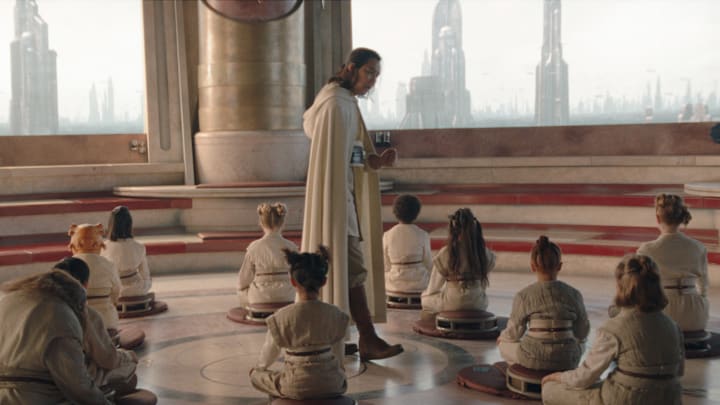The new trailer for the upcoming Star Wars show, The Acolyte, just dropped. In addition, several interviews with show creator Leslye Headland have dropped, and she makes clear that this show will take on the Jedi Order. This is well-trodden territory in Star Wars.
The Acolyte is not the first Star Wars media to question the Jedi Order
Headland has discussed how The Acolyte will challenge traditional notions of "good versus evil" and "Jedi versus Sith." It will be great to get another piece of media in the canon exploring this territory because it is at the heart of Star Wars. There is that poignant line towards the end of the trailer, "It’s not about good or bad. This is about power and who’s allowed to use it," which seems to be a general thesis statement for the show.
Power is at the heart of Star Wars. The Empire has power over the galaxy, and the Sith crave power. However, we have also seen the Jedi have the power in the prequel trilogy, and things ended up very badly.
The quote, "Absolute power corrupts absolutely," seems very relevant to this show and other times when the flaws of the Jedi Order have been explored.
By the time we get to the prequels, the Jedi Order has become a very powerful institution and, as Dave Filoni has pointed out, has lost its way to some degree. They are a quasi-political body that serves at the behest of the Senate and tries to do good, but they also work within the confines of a political system. One of the focuses of The High Republic, the era The Acolyte is set during, is this breakdown of how the Jedi Order got to this place in the prequel trilogy.
People have different theories on what the Jedi should be or what they were generations upon generations before the prequels. It seems like this was not how things started. I have always thought of the first generation of Jedi as a sort of nomadic, benevolent presence. Not acting on behalf of any political body but instead roaming the galaxy in search of suffering or conflict and trying to alleviate it.
In the prequels and the animated series Star Wars: The Clone Wars, we see the Jedi still try to hold true to those ideals while at the same time becoming warriors and generals, something that runs anathema to the role of the Jedi as peacekeepers. When one becomes a part of a powerful political structure or institution, the decisions one makes often become less about doing what is right and more about doing what will allow one to stay in power.
It seems that may be what The Acolyte will truly explore. As the Jedi investigate this new, rising darkness, perhaps we will see them become more obsessed with quashing any challenge to their status rather than acting compassionately and selflessly throughout the galaxy.
The series also promises to go beyond "good versus evil" tropes, which is another thing that Star Wars has done since its inception.
Some people will deride Star Wars as a simple story about "good guys versus bad guys," which misses the whole point of the saga. Episodes 1-6 tell the story of a man who is good but is driven to do horrible things because he seeks the power to save the people he loves. Ultimately, he is redeemed by his son, who has the opportunity to seize all of the power in the galaxy by striking down his father and the Emperor.
Instead, he throws down his lightsaber and rejects the pursuit of power. It is the ultimate repudiation of everything the Sith stands for and the ultimate encapsulation of everything a Jedi should be. Perhaps it should be no surprise that Luke was not brought up in the Jedi Order and instead received his unorthodox training in fits and starts from Obi-Wan and Yoda. He had none of the baggage of the Order and its rigid ways. He proved that being a Jedi is not about how high you can jump or how skilled you are with a lightsaber, for those skills are also possessed by the Sith. Instead, it is how big your heart is and whether you are willing to be selfless and choose compassion when the chips are down. In the process, he redeemed his father and defeated the Sith.
We will likely see characters confronted with similar choices in The Acolyte. It will be fascinating to see how these characters, many of them steeped in the rigid ways of the Order, respond to these challenges. Any good story should have morally grey characters who are conflicted and torn by the decisions they must make. That inner conflict is at the heart of all of Star Wars, so it will be great to explore these themes even further when The Acolyte debuts in June.
